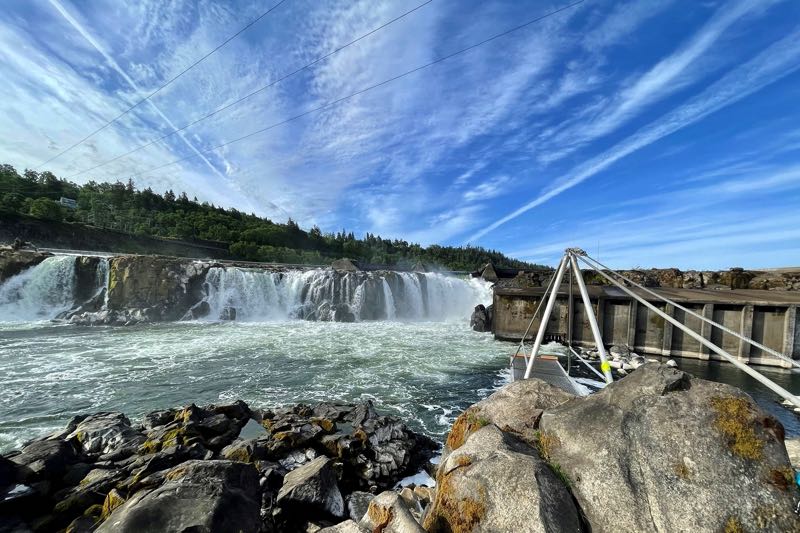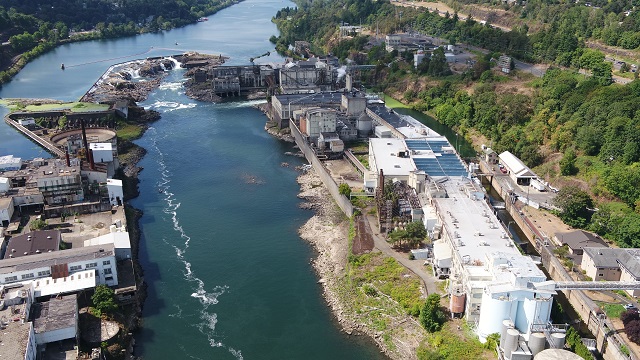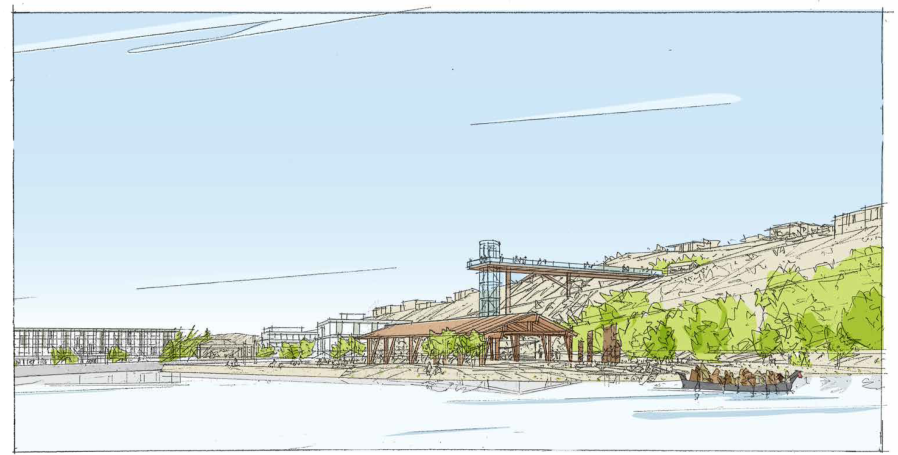PORTLAND, Ore. (KOIN) — As the second most powerful waterfall in North America, the Willamette Falls is an ancient cultural treasure of Oregon.
Straddling West Linn and Oregon City, the historic land surrounding the falls has remained closed to the public for over 150 years — though, that is soon to change.
The area is now back in Indigenous hands after the Confederated Tribes of the Grand Ronde purchased the 23-acre site outlining the falls in 2019.

Following a legacy of challenges, the uncertain future of the falls is now beginning to form, as the Confederated Tribes of the Grand Ronde willing to work with The Willamette Falls Legacy Project, the Willamette Falls Trust, as well as representatives from the Confederated Tribes of Siletz Indians, the Confederated Tribes of the Umatilla Indian Reservation, the Confederated Tribes of Warm Springs, and the Confederated Tribes and Bands of the Yakama Nation to return the beauty of the falls back to the public.
“This is a special time for our people as we begin our work as stewards of the falls,” said Cheryle A. Kennedy, Chairwoman of the Confederated Tribes of the Grand Ronde. “We are excited to begin the healing process for this land as well as take the first steps towards real progress in bringing our vision for this site to life.”

Since the 2011 closure of the Oregon City Blue Heron Paper Mill, the development of a Willamette Falls public land project has been slow, involving several setbacks and a rotating door of collaborators, spanning more than a decade.
Demolition of the former Blue Heron Paper Mill began in September of 2021. The Confederated Tribes of Grand Ronde commemorated the start of on-site work with a private gathering.
“To see actual demolition begin on-site was so exciting, after ten long years of discussion since the paper mill closed. We’ve been working hard towards this goal since acquiring the property and are proud to see the tangible impact begin,” said Chris Mercier, Vice-Chair of the Confederated Tribes of Grand Ronde. “This is a major step forward for the project and to reintroducing the general public to this special place.”

The Willamette Falls Legacy Project recently announced its commitment work alongside five local tribes with ancestral ties to the site to develop a Public Riverwalk, granting access to residents for the first time in more than 150 years.
The decision came after a formal request from the Willamette Falls Trust, a nonprofit organization fundraising and driving community engagement for the Public Riverwalk. Four of the five tribes now partnered on the project are represented on the trusts’ Tribal Leadership Committee.
In August, the Willamette Legacy Project consisting of the State of Oregon, Metro, Clackamas County, and Oregon City restructured their partnership to include representatives from all five Tribal Nations.
“We are ready to collaborate when the partners (the state of Oregon, Metro, Clackamas County and Oregon City) are able to move forward,” said Sara Thompson, Confederated Tribes of Grand Ronde Communications Director. “But in the meantime, we’re excited to be making tangible progress towards restoring this important place and being able to welcome the public to our land.”

In the spring of 2021, the Confederated Tribes of the Grand Ronde shared its vision for the site’s future. In a press release the Tribe stated, “That vision is focused on healing the land through extensive ecological restoration, celebrating the site’s tribal connection, and bringing the public back to Willamette Falls.”
Gerard Rodriguez, associate director for the Willamette Falls Trust told KOIN 6 News bringing together five tribal nations, four local agencies, and the state of Oregon into one project is likely going to come with some challenges. He added that the vision is to align their perspectives to uphold what the project deserves and create public access.
“This is a place that really matters. This site has always been an intertribal space and gathering place, which has held so much for the community,” Rodriguez explained. “The vision that we hear resoundingly, is how vital it is for that connection to take place.”
As an intertribal convener, Rodriguez says the Willamette Falls Trust is pushing towards agency and multitribal, native and non-native collaboration.
“We are working to ensure that a project of this magnitude doesn’t become a one-off,” stated Rodriguez. “Through Tribal leadership, our goal is for this to become a common practice throughout the nation. There are many instances where these sacred and culturally significant sites need to be protected and restored. “

It is expected to take a minimum of two to three years before the Riverwalk Project is fully realized. The first phase alone is projected to cost $65 million, of which $28 million has already been raised.
In 2019, voters overwhelmingly passed the Metro Parks and Nature Bond, which assigned an additional $20 million in public funding for the overall project.
